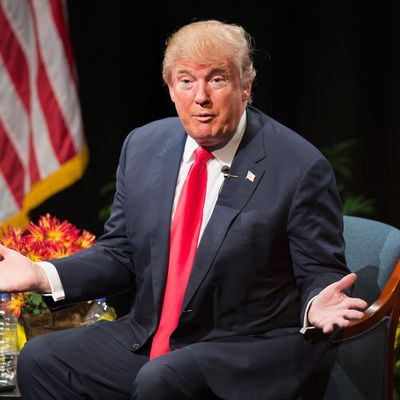
One reason Republican elites fear a Donald Trump presidential nomination is that they think he is simply not electable. (See Jonathan Chait’s assessment of Trump’s prospects published earlier today.) But another is that a bad performance at the top of the ballot could have serious consequences for GOP congressional and state and local candidates as well.
This is, of course, a debatable proposition. In 1972, with George McGovern carrying just one state against Richard Nixon, Democrats managed a net gain of two seats in the U.S. Senate. Couldn’t down-ballot Republicans distance themselves from a Trump presidential candidacy and thrive via massive ticket-splitting? In theory that might work, but, unfortunately for the GOP, there has been a steady trend toward straight-ticket voting in presidential years since 1972, as one might expect given the ideological “sorting out” of the two parties since then, intensified by the recent climate of partisan polarization. There simply aren’t any conservative Democrats or liberal Republicans running down-ballot anymore who can buck national partisan trends, and the pool of persuadable “swing voters” has shrunk as well.
The GOP’s margin in the U.S. House of Representatives is large enough to survive a pretty good straight-ticket pasting in 2016. Democrats need to gain 30 seats to take back the House, and that kind of swing has only happened twice in modern presidential years (1964 and 1980). The Senate is another matter. Republican seats in Arizona, Florida, Illinois, New Hampshire, North Carolina, Ohio, Pennsylvania, and Wisconsin could all be vulnerable to a Democratic presidential landslide or anything close to it.
There is, however, a counterargument, though a highly theoretical one, that Trump will bring out voters who would otherwise stay at home and who might vote Republican down-ballot in numbers sufficient to offset horrified swing voters. Sean Trende of RealClearPolitics published an analysis immediately after the 2012 elections suggesting that as many as 6 million white voters who participated in the 2008 elections gave the Obama/Romney contest a pass. These “missing white voters” were not, Trende argued subsequently, the ultra-conservative “base” voters that the right is always pointing to as the key to general-election victory; nor were they Evangelicals wary of Romney’s LDS faith. Instead, they were “largely downscale, Northern, rural voters” who were more secular than typical GOP voters. Trende identified them with the constituency attracted by Ross Perot in 1992. But there is little question there’s a significant overlap with Donald Trump’s white working-class base of support today.
Given these voters’ apparent alienation from the agenda of Republican elites, it’s not a lead-pipe cinch that they’d loyally vote a straight GOP ticket after turning out for the Donald. All in all, anti-Trump elements of the party are right to fear that nominating the reality star and tycoon would take them into perilous and uncharted territory.






























